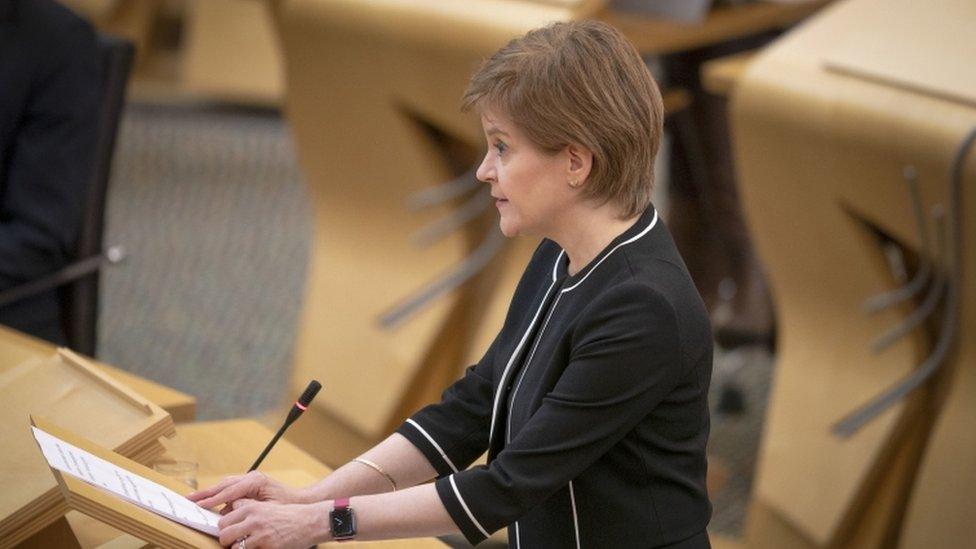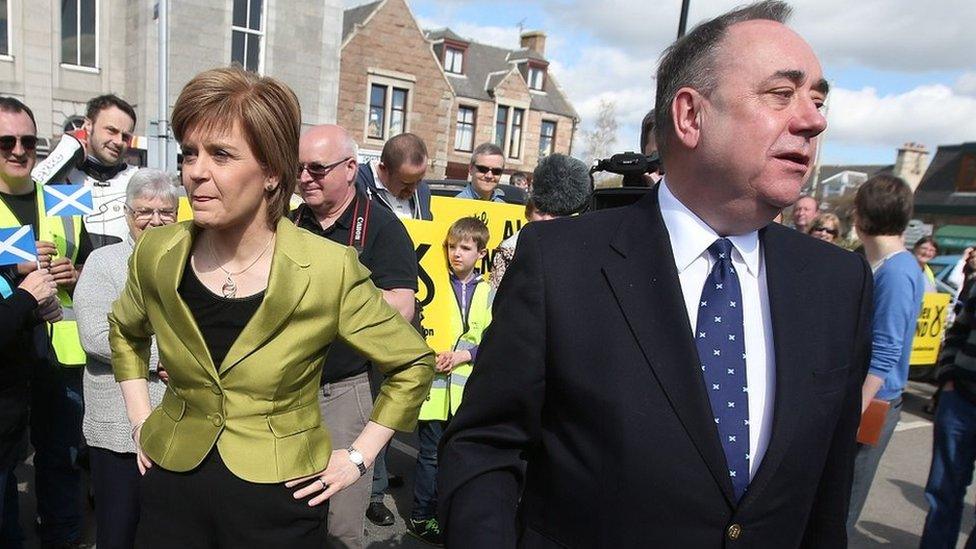Sturgeon survives Holyrood confidence vote over Salmond row
- Published

Scottish First Minister Nicola Sturgeon has survived a vote of no confidence at Holyrood over her government's handling of complaints against Alex Salmond.
A Holyrood committee inquiry has concluded that there were "serious flaws" in the government's approach.
The confidence vote was tabled by Tory MSP Ruth Davidson, who said nobody had taken responsibility for the failures.
But MSPs voted by 65 to 31 to reject the motion, with the Greens backing the SNP and Labour and Lib Dems abstaining.
Ms Sturgeon said she "may not have got everything right" in her handling of the matter, but insisted that she "acted appropriately and made the right judgements overall".
And she told opposition parties that if they wanted to remove her they should do it in the forthcoming election on 6 May, adding: "It is now time for the country to decide."
The Holyrood inquiry - which was set up in 2019 after the government conceded its handling of complaints against Mr Salmond had been unlawful - published its report earlier on Tuesday, stating that women had been badly let down by the failed process.
A majority of members said Ms Sturgeon had misled the inquiry in her evidence, and said they found it hard to believe that she was not aware of concerns about Mr Salmond's alleged behaviour before November 2017.
However an independent investigation by Irish lawyer James Hamilton concluded on Monday that Ms Sturgeon had not breached the ministerial code.
He said Ms Sturgeon had given an "incomplete narrative of events" to MSPs, but that he believed this was a "genuine failure of recollection" and not deliberate.

The Scottish Conservatives had tabled a motion of no confidence in Ms Sturgeon before either report had been published - saying that "overwhelming" evidence of wrongdoing had already emerged.
Ms Davidson, the party's leader at Holyrood, told MSPs that "nobody has taken responsibility for the multiple failings at every level which occurred".
She said that Ms Sturgeon "should not feel able to continue in post", and that "the honourable thing would be to resign".
Ms Davidson said: "The committee found that Nicola Sturgeon misled this parliament. Nothing can erase that fact, however inconvenient it is to the first minister and her supporters."


The best time for the opposition to call a no confidence vote is when they have enough support to win and can force a minister from office.
That has never been a realistic prospect for the Conservatives in their efforts to oust Nicola Sturgeon.
When they first announced plans for a vote the day before the first minister gave evidence to the Holyrood committee, it was clear she could see off their challenge with support from the Greens.
When she was cleared of breaking the ministerial code by the Hamilton inquiry, her position strengthened.
By pressing on regardless, the Tories managed to divide the opposition - with Labour and the Liberal Democrats refusing to vote with them and abstaining instead.
The Tories say that makes them the only party strong enough to take on the SNP.
But in enabling Nicola Sturgeon to comfortably win a confidence vote today they've given her a pre-election boost after some of her toughest weeks in office.

Ms Sturgeon said she "may not have got everything right in my handling of this situation", but said she would "reject entirely any suggestion of misleading this parliament".
And she said she would have resigned if Mr Hamilton had found she breached the code.
However she said she had been "cleared of any breach of the ministerial code", and told Ms Davidson: "If you think you can bully me out of office you are mistaken and have misjudged me.
"If you want to remove me from office as first minister, do it in an election".
Ms Sturgeon said she had been accused of "conspiracy against, collusion with and cover-up on behalf of Alex Salmond", but that "none of that is supported by evidence because none of that is true."
The first minister was backed by Scottish Green co-leader Patrick Harvie, who said the inquiry had become a "farce" and accused opposition members of the committee of "destroying the credibility of their own work".
Both Labour and the Lib Dems abstained in the final vote, meaning only the Conservatives backed the motion.
Scottish Labour leader Anas Sarwar said there had been a "litany of failures" by the government, but said the Tories were "only interested in getting a scalp" and "grubby party politics".
He said: "This is a day of shame for our parliament. Scotland deserves a better government and a better opposition."
Meanwhile Lib Dem leader Willie Rennie said "nobody wins from this ugly debate", and that the confidence debate and motion "cannot be the end" of the matter.